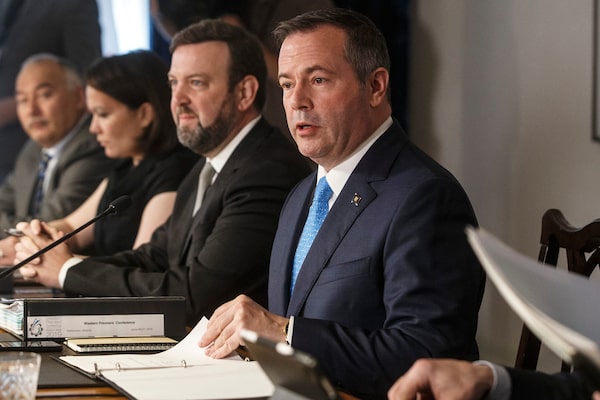
Alberta Premier Jason Kenney said the meeting’s agenda would focus in part on resource development – a key source of the animosity between Alberta and B.C.JASON FRANSON/The Canadian Press
Western and territorial premiers have agreed to step up the development of their natural resources even as Alberta and British Columbia are at an impasse in their dispute over the Trans Mountain pipeline expansion.
The premiers, who held their annual meeting in Edmonton on Thursday, issued a memo that included a commitment to expand markets for energy resources through the development of “critical” infrastructure such as pipelines, roads and ports. The document was endorsed by all seven premiers.
But it was clear that Alberta’s Jason Kenney and John Horgan of B.C. had made no progress on their provinces’ dispute over the expansion of the Trans Mountain oil pipeline. Mr. Kenney used an end-of-day news conference to repeat his threats to cut off oil shipments to B.C. or any other province that stands in the way of new pipelines, while Mr. Horgan said he would continue his opposition to the pipeline, including through a court case in which the province is seeking the authority to regulate the transportation of oil through its territory.
“I made clear to Premier Horgan that if we see from any province obstruction of the movement of our products in a way that violates the Constitution, we will take action to defend our vital economic interests,” said Mr. Kenney, whose first act as premier was to proclaim legislation allowing Alberta to restrict oil exports.
Mr. Kenney has said he would use the legislation, known as the turn-off-the-taps law, as a last resort. He repeated that on Thursday.
Mr. Horgan said he respects Ottawa’s jurisdiction to approve the Trans Mountain project, as it did for a second time last week. But he added that his opposition is unchanged.
“I’ve said that the federal government has the right to make the decision that they made,” Mr. Horgan said. “Having said that, I have a responsibility to make sure that I’m defending the things that matter to British Columbians.”
Mr. Horgan has said his government might join any renewed legal challenges of the federal approval. The Federal Court of Appeal overturned an earlier approval last fall, citing inadequate consultations with First Nations and failure to consider the impact on endangered killer whales.
B.C. is challenging the Alberta law in court. An application by B.C. to block the legislation until a decision is made in that case is scheduled to be heard in Calgary on Friday.
Mr. Kenney’s United Conservative Party government came to power in April on a platform of defending pipelines and Alberta’s oil sector against perceived enemies. He has repeatedly singled out B.C.'s NDP government, and Mr. Horgan in particular.
The Alberta government launched a million-dollar ad campaign in the Vancouver region promoting the Trans Mountain project and blaming Mr. Horgan’s actions for high gas prices.
The B.C. government’s challenge of the turn-off-the-taps law has yet to be heard. The province lost the constitutional reference case seeking the authority to regulate crude shipments through the province, but is appealing to the Supreme Court of Canada.
Mr. Horgan, who promised in the 2017 election campaign to use “every tool in the toolbox” to block the Trans Mountain project, said his opposition is directed at Ottawa.
“I have no qualms with the people of Alberta; I have no quarrel with people in other parts of Canada,” he said.
The premiers’ memo also included commitments to take action on climate change, although they have publicly disagreed on how to do that. The leaders of Alberta, Saskatchewan and Manitoba oppose the federal government’s climate-change policy, which puts a price on carbon emissions, while B.C. is an enthusiastic supporter, having adopted Canada’s first carbon tax in 2008.
The memo also called for action on removing interprovincial trade barriers such as for alcohol, facilitating certification for skilled workers who move between provinces, and putting more resources toward responding to the opioid crisis.
All of Canada’s premiers will gather in Saskatchewan in two weeks.
We have a weekly Western Canada newsletter written by our B.C. and Alberta bureau chiefs, providing a comprehensive package of the news you need to know about the region and its place in the issues facing Canada. Sign up today.
 James Keller
James Keller